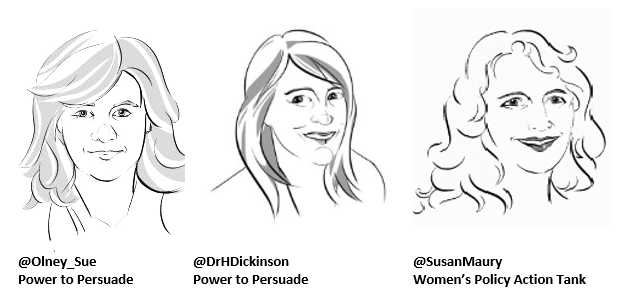Holiday reading - 2019 wrap-up
As 2019 draws to a close, the Power to Persuade and the Women’s Policy Action Tank will be taking a break over the holiday season. We will start the blog back up in February.
Over the past year, the blog has had over 100,000 page views from nearly 66,000 unique visitors. We oversaw an upgrade to the site to make our content easier to read and more accessible. We also held a successful symposium in October.
To leave you with some holiday reading, we have compiled our top 5 most-read blogs that were authored in the past year.
Women’s Policy Action Tank - most read
The most-read blogs for the Women’s Policy Action Tank were primarily focused on how the welfare and child support systems have failed women. The most-read blog for 2019 is Australia’s child support system facilitates economic abuse, authored by Kristin Natalier and based on research she conducted into the child support system. This blog was read over 3,600 times. In second place, with 2,300 reads, is “I should be able to provide that”: How Welfare-to-Work affects low-income single mothers’ food provision, co-authored by Natalie Jovanovski and Kay Cook and detailing their research findings. In third place, Ella Buckland shares her own and other single mothers’ experience of ParentsNext: Thanks for asking… Mothers say ParentsNext puts parents last. Kris Natalier and Terese Edwards collaborated on the 4th-place entry - Child support and the F word. Fifth place is held by a blog that was part of our election series, providing much-needed commentary from Hayley Foster: Why is the Coalition funding couples counselling in instances of domestic and family violence?
Power to Persuade - most-read
The top five most-read blogs from the Power to Persuade covered a more diverse range of issues. In the top slot, with nearly 1,000 reads, is What is wrong with Work for the Dole – reciprocity fail, by Simone Casey. Not far behind is the wonderful summary from Aurora Milroy on her talk from the Power to Persuade Symposium: Black swans make better policy. (She wrote more on this theme in July with Why Indigenous values matter for all public servants and all communities.) Simone Casey also holds 3rd-place spot, Does tree-shaking work? Evidence based policy and welfare conditionality. Fourth place is held by a piece that provides important insight: What Australians think about poverty – and how it can change, part 1 and part 2, by Maiy Azize. Dia J. Andrews provides the 5th-most read blog, The future of Australian federal anti-corruption policy.
We also like to highlight a few pieces that we felt were under-read. Here’s our list of important pieces that you may have missed.
Power to Persuade - not to be missed
An important piece by Jane Monckton Smith provides critical policy insight into keeping women experiencing domestic and family violence safer, with Tracking intimate partner homicide risk escalation: The homicide timeline. Sandra Elhelw Wright also wrote on domestic and family violence, but from the angle of how research is hampered by prejudicial social norms through a reflection of her own research - Islamophobia: The elephant in the research. Gemma Carey provides a fresh take on the policy process with her piece, Can feminism help us with better policy implementation? Sure can! An important piece on Australia’s commitment to the Sustainable Development Goals by Megan Weier reminds us that the SDG’s can have an impact in Australia if we value them: How the Sustainable Development Goals can help change the way we evaluate federal budgets and election platforms. Finishing on a hopeful note, Millie Rooney shares a visionary piece with Listening in: using the election results to create a better Australia.
Women’s Policy Action Tank - not to be missed
Women’s experience of the criminal justice system is extremely problematic; Helen Forster provides an alternative process in her piece, Rethinking justice: The transformative potential of health-justice partnerships. Another piece from our election series, Caught up in CDP’s punitive web: What remote women have to win (or lose) on May 18, by Zoe Staines, provides an important analysis beyond the election cycle into how the CDP oppresses Indigenous women. In a piece that hit a raw nerve with many women, Nichole Badstruber gave us Mind the gender gap: The hidden data gap in transport. Personal stories and lived experience can bring policy to life in a way like nothing else; it was therefore an honour to give ‘Lorraine’s’ story a platform, which clearly illustrates how life’s ups and down too often end in housing precarity for older women: Skilled, productive, resilient – what’s going wrong for older women? Lorraine’s story (and you can read more about the research she contributed to in our blog Co-operative ageing: Innovative solutions to older women’s precarious housing, by Myfan Jordan). And finally, for a story that has ramifications for anyone one welfare, Monique Hurley explains how technology magnifies policy failings for those most marginalised: Supercharging discrimination: The Targeted Compliance Framework and the impact of automated decision-making.
We wish to especially thank our hard-working Moderators, who share the responsibility across the year for sourcing and sharing such rich content. Our insightful Social Policy Whisperers also deserve a thank you for their commitment to illuminating the policy process. And of course we are grateful to our authors, who generously share their expertise.
Happy Holidays and we’ll see you in 2020!
With thanks to Laura Vidal for designing our holiday card.


